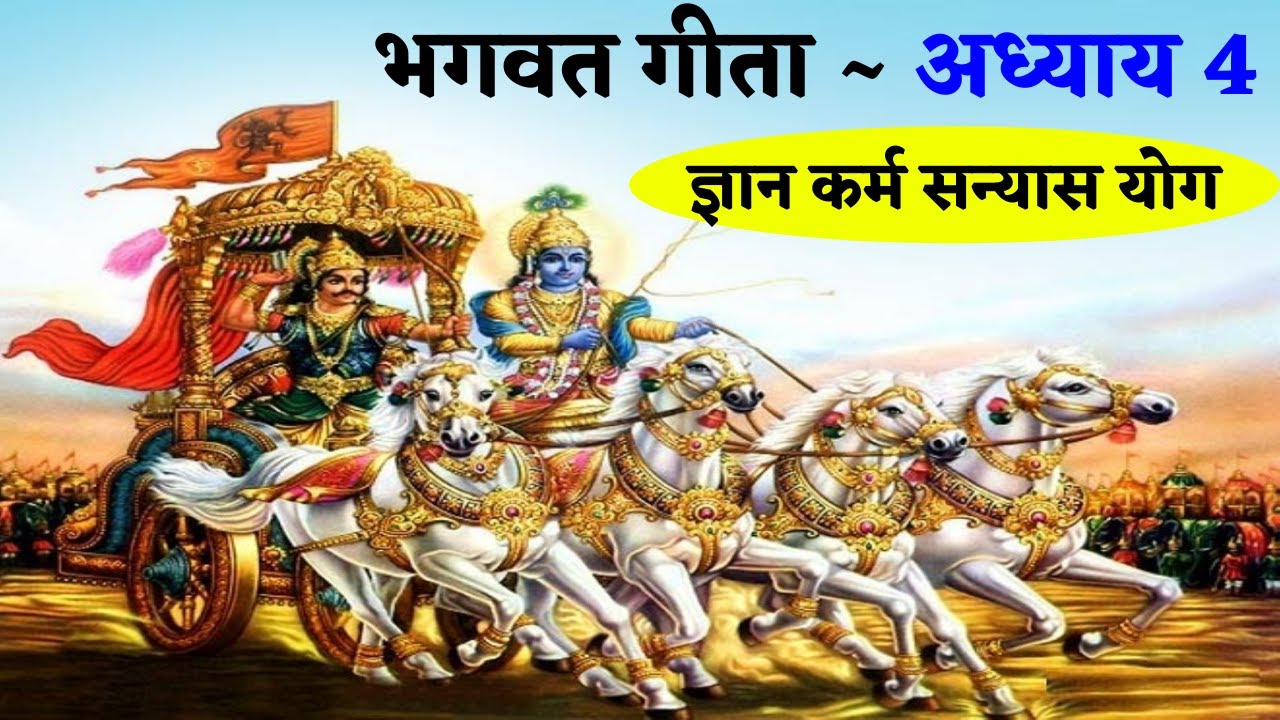।। Shrimadbhagwad Geeta ।। A Practical Approach ।।
।। श्रीमद्भगवत गीता ।। एक व्यवहारिक सोच ।।
।। Chapter 04.B।। Preamble II
।। अध्याय 04.B ।। प्रस्तावना II
PREAMBLE – Chapter Four “ Transcendental Knowledge “ “ Gyan, Karm, Sanyas Yog “
To strengthen Arjun’s faith in the knowledge He is imparting, Shree Krishna reveals its pristine origin in this chapter. He says, “Arjun, as you are my devotee and a dear friend, I am revealing this supreme science of yog to you. It is the same eternal science that I taught to the Sun God at the beginning of time. And in a continuous tradition, the same knowledge; was passed to the saintly kings.” Arjun wonders how someone who is almost his age could exist so many eons ago. He asks Shree Krishna how is it possible that you gave this knowledge to the Sun God and the others so many years back in time.
Shree Krishna clarifies Arjun’s doubts and discloses the divine mystery of His dissension. He says that although God is unborn and eternal, it is to establish dharma (the path of righteousness) that He descends on this earth by His Yogmaya power. His birth and activities are divine and cannot get tainted by material imperfections. Once a devotee knows this secret and engages in devotion with great faith, he attains God and does not take birth in this world again.
Then Shree Krishna goes back to karm yog, the subject from the previous chapter. He continues to explain the nature of work and its three principles: action, in-action, and forbidden action. He elaborates that the karm yogis, even while performing the most engaging task, are in the state of inaction and do not get entangled in the karmic reactions of such action. Knowing this, the ancient sages performed all their work as an act of sacrifice for the pleasure of God. They were not affected by happiness, distress, success, or failure. He explains that when sacrifice is suitably dedicated, performed with proper knowledge and pure sentiments, then its remnants become like nectar. And by partaking such nectar, the devotees are cleansed of all impurities. Even the biggest sinner can cross over the ocean of material miseries by boarding this boat of eternal knowledge.
Shree Krishna says that such knowledge should be acquired only from a genuine spiritual master, who himself is God- realized. Being his Guru, Shree Krishna instructs Arjun to cut apart all doubts that have arisen in his heart with this sword of knowledge. He asks Arjun to now get up and perform his duty as a warrior.
(Preamble – Courtesy – “The songs of GOD – Swami Mukundananda”)
प्रस्तावना – चतुर्थ अध्याय – ज्ञान कर्म सन्यास योग
“निःस्पृहता से अपना कार्य करते रहने से अंत मे परम् सिद्धि मिलती है” मनु स्मृति 6.69 में आसक्ति रहित निष्काम कर्म की बात कही गई है जो यह सिद्ध करता है कि भगवान श्री कृष्ण जो भी कर्मयोग के बारे में बता रहे है वह पहले से ही भागवत धर्म का ही हिस्सा है, एवम इस वर्णन अनेक पुराणों में भी है।
चौथे अध्याय में, जिसका नाम ज्ञान- कर्म- संन्यास- योग है, यह बताया गया है कि ज्ञान प्राप्त करके कर्म करते हुए भी कर्म संन्यास का फल किस उपाय से प्राप्त किया जा सकता है। यहां ज्ञान शब्द परमार्थ ज्ञान अर्थात तत्वज्ञान का, कर्म शब्द कर्मयोग अर्थात योग मार्ग का और सन्यास शब्द सांख्य योग अर्थात ज्ञानमार्ग का वाचक है। विवेक ज्ञान और शास्त्र ज्ञान भी ज्ञान शब्द के अंतर्गत है।
इस में सच्चे कर्मयोग को चक्रवर्ती राजाओं की परंपरा में घटित माना है। मांधाता, सुदर्शन आदि अनेक चक्रवर्ती राजाओं के दृष्टांत दिए गए हैं। इस मे कर्म में अकर्म और अकर्म में कर्म देखने वालो की प्रशंसा की गई है । कर्म में निसंग होना एवम अकर्म को प्राप्त करना स्थितप्रज्ञ की स्थिति है। जिसे परत दर परत भगवान श्री कृष्ण अर्जुन को समझा रहे है। अर्जुन युद्ध के मोह एवम भय से तो मुक्त हो गया किन्तु अभी तक निर्णय लेने की क्षमता को नही प्राप्त कर सका और अब वह इस विषय मे पूरी रुचि के साथ अपनी शंकाओ का निवारण चाहता है।
यहीं गीता का वह प्रसिद्ध आश्वासन है कि जब जब धर्म की ग्लानि होती है तब तब मनुष्यों के बीच भगवान का अवतार होता है, अर्थात् भगवान की शक्ति विशेष रूप से मूर्त होती है।
यहीं पर एक वाक्य विशेष ध्यान देने योग्य है- क्षिप्रं हि मानुषे लोके सिद्धिर्भवति कर्मजा (४१२)। ‘कर्म से सिद्धि’-इससे बड़ा प्रभावशाली जय सूत्र गीतादर्शन में नहीं है। किंतु गीतातत्व इस सूत्र में इतना सुधार और करता है कि वह कर्म असंग भाव से अर्थात् फलासक्ति से बचकर करना चाहिए।
चौथे श्लोक से ले कर उंतीसवे श्लोक तक भगवान ने बहुत प्रकार से विहित कर्मो के आचरण की आवश्यकता प्रतिपादित की है, तीसवें श्लोक में भक्ति प्रधान कर्मयोग से भगवादपर्ण बुद्धि से कर्म की आज्ञा दी है, इकतीसवे से पैतीसवे श्लोक तक उक्त सिंद्धात से कर्म करने वालो के बारे में बताया गया है फिर छतीसवे में अर्जुन के पूछने पर अध्याय समाप्ति तक काम को सारे अनर्थो का हेतु बतलाकर बुद्धि के द्वारा इन्द्रियों और मन को वश में कर के काम को मारने की आज्ञा दी है।
निष्काम कर्मयोग अपने आप मे अत्यंत गहन विषय है एवं वैराग्य तप के ही समान है। इसलिये अब इसे विस्तृत रूप में अध्याय 4 एवम 5 में भी समझेंगे।
।। हरि ॐ तत सत ।। प्रस्तावना – अध्याय 4।।
Complied by: CA R K Ganeriwala ( +91 9422310075)
